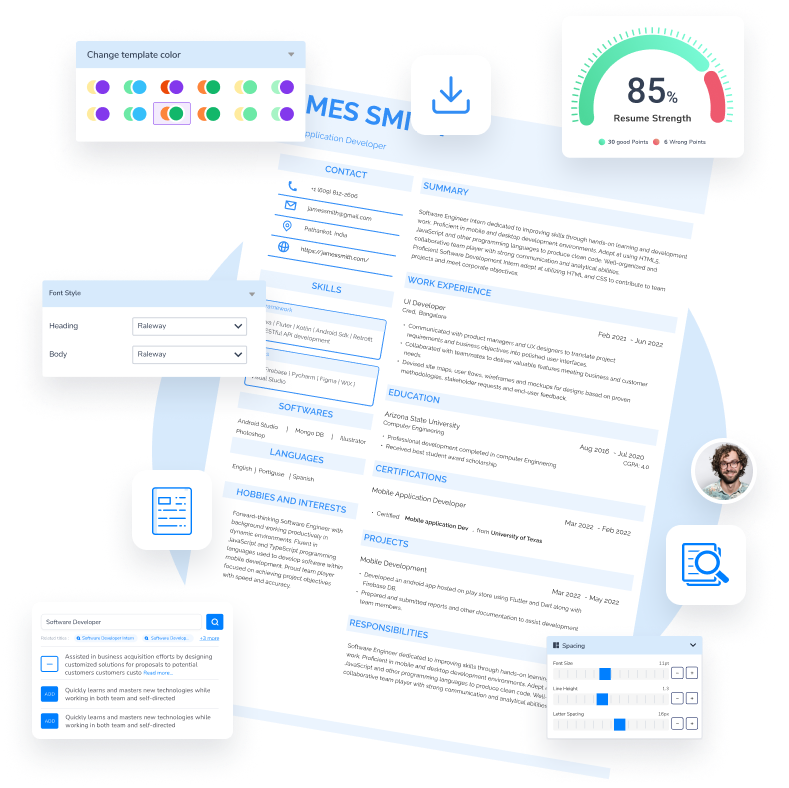Tips To Manage Multiple Interviewer Panel.
3 Min read

Imagine you will face not one but several panellists evaluating your potential- all concomitantly! You might be thinking, "That's not fair!" but that's the most standard way for companies to get a move on the hiring process.
In addition to your cover letter and resume, a job interview is an essential opportunity for a potential employer to evaluate your qualifications.
Despite the fact that the majority of interviews consist of one-on-one interactions with the hiring manager, some require speaking with multiple members of the hiring team simultaneously.
Instead of having candidates come in for assorted interviews, panel interviews are a well-planned and practical option for companies that cut corners rather than fanning out the process over weeks or even months.
As these multidimensional interactions might be more difficult than conventional interviews, additional preparation is often required.
Yes, building a good equation with multiple appraisers in that compressing situation may seem more arduous than connecting with just one. But it's pretty achievable once you have the right guidance and pointers to deal with multiple interviewer panel.
Let's look for some tips to help you crack the panel interview. Knock on wood!
Interviewing in front of a panel is hard, but if you think you can get the job by treating it like a one-on-one interview, this may sound iffy.
In a room where you're expected to stay alive with a smile on your face, you have to deal with both the ideal challenges and the ones you didn't expect.
So how and what should be your point of action? Let's take a look!
Predominantly your panel will constitute disparate departments who are experts in their fields, which insinuates that they will appraise your skills and ability through a varied perspective.
So, you must get the picture clear of who is going to be in the panel. A simple way of doing this exercise is to raise a query to the company contact (anyone who you had a conversation in the first place or maybe exchanged an email with).
This will favour you in judging what questions can come from whom and essentially where you should be focusing more.
You need to be confident in managing the interview panel. Once you are confident about who will be sitting on the other side of the panel, you can work on building a favourable equation by connecting both at an individual level and conjointly as a group.
You can answer all the questions directly but then elucidate further by building on points referring to other panellist's standpoints.
For instance, one interviewer may pose about how efficiently you have run a team in the past- but the executives from other departments would be more interested in knowing your caliber in handling and working interdepartmentally.
Surviving against the "Firing squad" is a skill, but who said you can't learn to come across this round? The trick is you must know how to pull the strings by steering the momentum of the conversation.
In the show, you must ensure you answer to the point and not run around the bush. If another question comes up to you in the middle of your answer, you must gauge which one is critical and finish your thought duly.
Apart from the prompt response, preparing for follow-up questions is imperative. Multiple panellists give an extensive opportunity to interact with all the members and have insightful discussions. From targeting a micro perspective to getting a holistic picture will surely help you get through the interview round.
Those 45 to an hour and a half can be daunting. Self-distrust may squirm anytime, but think this way- what's the worst thing that can happen? You may not be able to answer a question.
You can humbly speak your mind and maybe share some instances from your experience. Moreover, don't be petrified about asking on sorting out questions you cannot comprehend.
When you arrive for the panel interview make sure you carry enough number of copies of each document you need to carry, like your resume, certificates or anything relevant, for each panellist.
Your response to this question should explain why your abilities and experience qualify you for the position. When responding, begin with a brief summary of your present career level before outlining your professional origins and goals for the future.
This is a common question used by interviewers to distinguish you from other candidates. Discuss what distinguishes you from other candidates and how you stand out in your response.
Before showcasing a single factor that makes you an excellent candidate, begin by describing your experience and past accomplishments as they pertain to the job position.
The purpose of this inquiry is to evaluate your teamwork skills and capacity to collaborate with others.
Discuss a concrete example that demonstrates your teamwork ability, including a problem you overcame and a successful conclusion you reached, in your response.

Try Now for Free!







